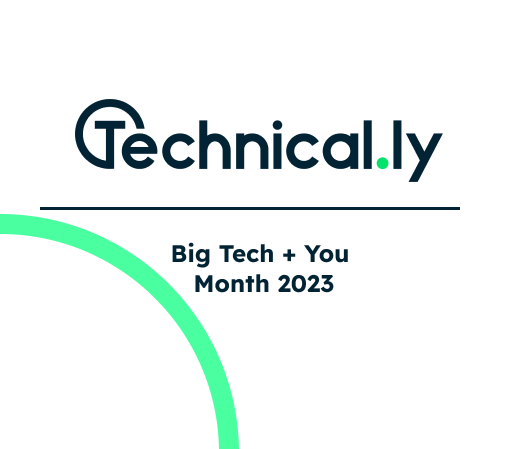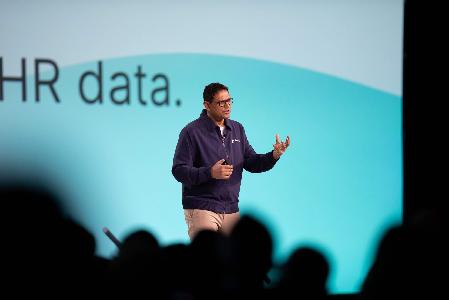
This editorial article is a part of Big Tech + You Month 2023 in Technical.ly’s editorial calendar.
But is Big Tech all it’s cracked up to be?
We’re talking about the five best-known American information technology companies: Microsoft, Amazon, Meta, Apple and Alphabet. These companies seem to be omnipresent in the tech world, and are household names for even non-technologists. They routinely rank among the best workplaces in the world. For many aspiring tech pros, an internship at these tech giants is seen as a surefire way in to a promising career. Acceptance rates for some are reportedly lower than those of Ivy League schools.
Four students at Philadelphia universities told Technical.ly about their experiences interning at Meta, Amazon and Google. They shared that, just like most things in life, there are benefits and challenges, pros and cons.
The working environment is very fast paced, they said, and adaptability is important. The perks to these jobs include getting to work with some of the most talented pros in the industry, and working on the technology consumers use every day. Ultimately, they felt their experiences set them up well for a future in tech.
Here are the lessons these students learned across their internship experiences:
Meet the students
Salamata Bah wasn’t always sure about pursuing a degree in computer science. When she finally decided to, she still wasn’t sure what career path she wanted to apply her degree to. To test out the different pathways she could take, the Drexel senior interned at eMoney and IBM, and last summer she headed to Menlo Park after being accepted into the Meta University internship program.
The first three weeks were akin to a bootcamp where she learned about web application and full-stack development, she told Technical.ly. Later, she was able to develop her own idea with the help of a mentor and created a mentorship match website for students. She also worked on a dashboard redesign project for Instagram advertisers.

Salamata Bah. (Courtesy photo)
Ethan Zhang started applying for internships when he first started his master’s degree in computer science at the University of Pennsylvania. He recalls receiving a lot of rejections, and said he found the application process particularly challenging because his undergrad background wasn’t specifically in comp sci, but chemistry. And as an international student, his visa limits the companies he can apply to and work for. Now as a second-year student who plans to graduate in the spring, Zhang has a software development engineering internship at Amazon on his resume. He work at the company’s Seattle headquarters involved updating Alexa’s features on Amazon devices.
Amazon “has very well-rounded support for international students,” he said. “And it was expanding quickly, so it actually [was] actively hiring at that point. I think that’s a big reason why I heard back.” (The company has since laid off thousands of employees amid a wave of Big Tech downsizing.)
For his part, Ansh Chandnani said he didn’t expect to hear back at all when he applied for a Google internship. The Drexel senior said he has long been interested in cybersecurity and was able to pursue that interest at Google’s threat detection and monitoring team in Silicon Valley. Over the course of two internships, he said, he built an on-demand uniform testing platform and worked with open source intelligence.
And Ngov, currently a senior at Drexel, got his first Big Tech experience when he interned at Amazon’s Seattle headquarters last summer. He told Technical.ly he worked on a project measuring the potential return on investment for placing an Amazon Ring ad in the Super Bowl.
The interview process
All the students described a thorough interview process before being hired, with three or four rounds of interviews, just like one would expect for a full-time role. Ngov said he was asked questions about situations related to roles outside the role he was applying for.
“I think a lot of these Big Tech companies are just looking for a holistic person who can not only develop, but they can also communicate with the business,” he said.
Chandnani said he later learned that one of Google’s interviewing strategies is to purposefully ask questions until the candidate has trouble answering them.
“The questions are designed to sort of lead you down a path where you can’t answer them any longer,” he said, “just because they want to test how proficient you are.”

Ansh Chandnani. (Courtesy photo)
Learning opportunities
Bah believes having a Big Tech internship on her resume has helped her get more attention from other companies. Another benefit is that her professional network now includes high-up technologists at Meta who are willing to mentor her.
Ngov noted “adaptability” a valuable skill interns can gain from working in Big Tech — not just regarding the actual work, but for wearing different professional hats within your team.
Chandnani learned that every Big Tech company has their own way of doing things. He said Google didn’t have as in-depth a training program as Meta, for instance, and it was intimidating to learn the company’s systems on the job. But gaining the skill to pivot as needed will be valuable in the course of his career, he said.
If you have a “fundamental understanding of how technologies work under the hood, you can basically adapt those foundational concepts to any specific technology that any company might be using,” he said.
Zhang and Chandnani both said they appreciated the fact that their work would actually affect users.
“You got a chance to make some impact to deliver features to real customers,” Zhang said. “That’s as an intern, so I expect to continue that kind of workstyle [when] working full time. ”
Challenges
Bah agreed that working in Big Tech forces you to become adaptable, but the pace of work is challenging. She said it’s also harder to be recognized for individual contributions because you’re a “small fish in the ocean.”
“It’s not like I don’t see myself working in Big Tech, but I definitely know if I want to go full time into Big Tech, I’ll have to make sure that I have skills,” she said, “and those skills need to be very irreplaceable and very valuable so that I can get the recognition that I want.”
Ngov said the pace of work at Amazon was fast, and it was challenging for him to meet deadlines in a short period of time. He felt added pressure, too, that his work would probably impact larger parts of the company, “so it challenged me personally to reach out to engineers and communicate my problems, but also be able to learn how to learn quickly,” he said.

Jason Ngov. (Courtesy photo)
Chandnani said there is always a risk at these big companies that you will spend weeks or months working on a project, testing it, figuring out how to integrate it — and then the company won’t be able to use your work because of changed compliance regulations or the like.
“When you work in Big Tech, sometimes it can feel like you’re this well-sharpened gear in this much, much larger machine,” he said. “So sometimes it might be difficult to get complete ownership of the projects that you do, and truly understand their impact.”
In terms of pros and cons with Big Tech compared to smaller tech companies, Zhang said at the latter, there is a better chance of interns working on a big, outwardly impactful project; however, Big Tech tends to offer more stability and a reasonable expectation for how your career path will go (despite, again, this being a moment when several Big Tech companies are enacting mass layoffs).
How did Big Tech impact their future plans?
Before interning at Amazon, Ngov interned at Bala Cynwyd-based trading and tech firm Susquehanna International Group and accepted a full-time offer there ahead of graduating this summer. He chose Susquehanna over a Big Tech company because of the “small company feel.” While he appreciates the rigor and the technical talent he faced daily when working at Amazon, he said, at Susquehanna, he can still be surrounded by passionate, talented people.
For Bah, a student who was previously undecided about what she wanted to do with her career, her internship experience helped her decide that she wants to work in data science. She even has another internship lined up at Apple where she’ll get to work in machine learning, she said.
After graduating, Zhang’s goal is to learn as much as possible, as efficiently as possible, to start his career. He feels a Big Tech company would be the best place to do that.
Chandnani said he enjoyed his experience working for Google, and appreciated that everyone on his team pushed each other to do their best work. He didn’t tell Technical.ly where he wants to end up post-grad, but he said the skills he gained at Google will stick with him.
“I think the more fundamental skills that you learn of being adaptable, wearing multiple hats, not being not being afraid of learning new things and tackling novel problems — I think they open a lot of prospects,” he said.
Chandnani also offered a piece of advice for anyone considering applying for a Big Tech internship: Don’t put off applying because you don’t think you’re good enough yet.
“I just like to say go for it,” he said. “What’s the worst that could happen?”
Sarah Huffman is a 2022-2024 corps member for Report for America, an initiative of The Groundtruth Project that pairs young journalists with local newsrooms. This position is supported by the Lenfest Institute for Journalism.Join the conversation!
Find news, events, jobs and people who share your interests on Technical.ly's open community Slack

Philly’s IT department fires long-tenured staff amid a high-level shakeup of priorities

Why is it so hard to find entry-level software engineering jobs?

Is AI really something new — or just the next big technology platform?


